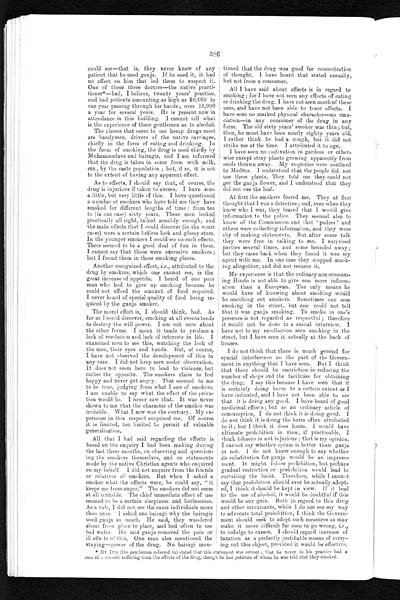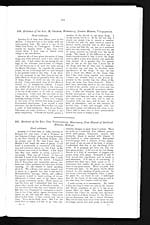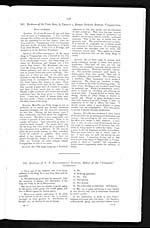Medicine - Drugs > Report of the Indian Hemp Drugs Commission, 1894-1895 > Volume VI > Evidence of Madras witnesses
(404) Page 386
Download files
Individual page:
Thumbnail gallery: Grid view | List view

386
could see—that is, they never knew of any
patient that he used ganja. If he used it, it had
no effect on him that led them to suspect it.
One of these three doctors—the native practi-
tioner*—had, I believe, twenty years' practice,
and had patients amounting as high as 20,000 in
one year passing through his hands; over 16,000
a year for several years. He is present now in
attendance in this building. I cannot tell what
is the experience of these gentlemen as to alcohol.
The classes that seem to use hemp drugs most
are handymen, drivers of the native carriages,
chiefly in the form of eating and drinking. In
the form of smoking, the drug is used chiefly by
Muhammadans and bairagis, and I am informed
that the drug is taken in some form with milk,
etc., by the caste population; but, if so, it is not
to the extent of having any apparent effect.
As to effects, I should say that, of course, the
drug is injurious if taken to excess. I have seen
a little, but very little of this. I have questioned
a number of smokers who have told me they have
smoked for different lengths of time: from ten
to (in one case) sixty years. These men looked
practically all right, talked sensibly enough, and
the main effects that I could discover (in the worst
cases) were a certain listless look and glassy stare.
In the younger smokers I could see no such effects.
There seemed to be a good deal of fun in them.
I cannot say that these were excessive smokers;
but I found them in these smoking places.
Another recognized effect, i.e., attributed to the
drug by smokers, which one cannot see, is the
great increase of appetite. I heard of one poor
man who had to give up smoking because he
could not afford the amount of food required.
I never heard of special quality of food being re-
quired by the ganja smoker.
The moral effect is, I should think, bad. As
far as I could discover, smoking at all events tends
to destroy the will power. I am not sure about
the other forms. I mean it tends to produce a
lack of resolution and lack of interests in life. I
examined men to see this, watching the look of
the men, their eyes and hands. But, of course,
I have not observed the development of this in
any case. I did not keep men under observation.
It does not seem here to lead to violence, but
rather the opposite. The smokers claim to feel
happy and never get angry. That seemed to me
to be true, judging from what I saw of smokers.
I am unable to say what the effect of the priva-
tion would be. I never saw that. It was never
shown to me that the character of the smoker was
irritable. What I saw was the contrary. My ex-
perience in this respect surprised me. Of course
it is limited, too limited to permit of valuable
generalisation.
All that I had said regarding the effects is
based on the enquiry I had been making during
the last three months, on observing and question-
ing the smokers themselves, and on statements
made by the native Christian agents who enquired
on my behalf. I did not enquire from the friends
or relatives of smokers. But when I asked a
smoker what the effects were, he could say, "it
keeps me from anger." The smokers did not seem
at all irritable. The chief immediate effect of use
seemed to be a certain sleepiness and listlessness.
As a rule, I did not see the same individuals more
than once. I asked one bairagi why the bairagis
used ganja so much. He said, they wandered
about from place to place, and had often to use
bad water. He said ganja removed the pain or
ill effects of this. One man also mentioned the
staying—power of the drug. No bairagi men-
tioned that the drug was good for concentration
of thought. I have heard that stated casually,
but not from a consumer.
All I have said about effects is in regard to
smoking; for I have not seen any effects of eating
or drinking the drug. I have not seen much of these
uses, and have not been able to trace effects. I
have seen no marked physical character—no ema-
ciation—in any consumer of the drug in any
form. The old sixty years' smoker was thin; but,
then, be must have been nearly eighty years old.
I rather think he had a cough, but it did not
strike me at the time. I attributed it to age.
I have seen no cultivation in gardens or other-
wise except stray plants growing apparently from
seeds thrown away. My enquiries were confined
to Madras. I understood that the people did not
use these plants. They told me they could not
get the ganja flower, and I understood that they
did not use the leaf.
At first the smokers feared me. They at first
thought that I was a detective; and, even when they
knew who I was, they feared that I would give
information to the police. They seemed also to
know of the Commission and that 'padres' and
others were collecting information, and they were
shy of making statements. But after some talk
they were free in talking to me. I surprised
parties several times, and some bounded away;
but they came back when they found it was my
agent with me. In one case they stopped smok-
ing altogether, and did not resume it.
My experience is that the ordinary non-consum-
ing Hindu is not able to give one more inform-
ation than a European. The only means he
would have of knowing about smoking would
be searching out smokers. Sometimes one sees
smoking in the street, but one could not tell
that it was ganja smoking. To smoke in one's
presence is not regarded as respectful; therefore
it would not be done in a casual interview. I
have not to my recollection seen smoking in the
street, but I have seen it actually at the back of
houses.
I do not think that there is much ground for
special interference on the part of the Govern-
ment in anything that I have seen. But I think
that there should be restriction in reducing the
number of shops and the facilities for obtaining
the drug. I say this because I have seen that it
is certainly doing harm to a certain extent as I
have indicated, and I have not been able to see
that it is doing any good. I have heard of good
medicinal effects; but as an ordinary article of
consumption, I do not think it is doing good. I
do not think it is doing the harm often attributed
to it; but I think it does harm. I would have
ultimate prohibition in view, if practicable. I
think tobacco is not injurious: that is my opinion.
I cannot say whether opium is better than ganja
or not. I do not know enough to say whether
its substitution for ganja would be an improve-
ment. It might follow prohibition, but perhaps
gradual restriction or prohibition would lead to
curtailing the habit. Therefore, while I cannot
say that prohibition should ever be actually adopt-
ed, I think it should be kept in view. If it lead
to the use of alcohol, it would be doubtful if this
would be any gain. Both in regard to this drug
and other intoxicants, while I do not see my way
to advocate total prohibition, I think the Govern-
ment should seek to adopt such measures as may
make it more difficult for men to go wrong, i.e.,
to indulge to excess. I should regard increase of
taxation as a perfectly justifiable means of carry-
ing out this object, provided it would be effective.
* Mr. Itty (the gentleman referred to) stated that this statement was correct; that he never in his practice had a
case of a patient suffering from the effects of the drug, though he had patients of whom he was told that they smoked.
Set display mode to: Large image | Zoom image | Transcription
Images and transcriptions on this page, including medium image downloads, may be used under the Creative Commons Attribution 4.0 International Licence unless otherwise stated. ![]()
| India Papers > Medicine - Drugs > Report of the Indian Hemp Drugs Commission, 1894-1895 > Volume VI > Evidence of Madras witnesses > (404) Page 386 |
|---|
| Permanent URL | https://digital.nls.uk/74910267 |
|---|




